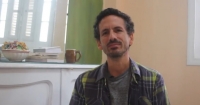Boris González Arenas
* 1976
-
“Because all these organizations are tools of the State Security to destroy all work of groups against racial discrimination, against femicides, or supporting the independent LGBT movement; all these organizations are reflection of pure repression of the regime. How are we going to treat Mariela Castro, daughter of Raúl Castro, for example? This is going to be decided by the president of a new democratic Cuba and he cannot persecute them, because we will be in a new state with democratic laws. We must be careful with that. As today I talk so much about not doing to the other ones, what you do not want them to do to you…Will we have some transitional government, some democratic government so consistent with the principle that I am describing you now? Hopefully yes, hopefully we will have a consistent government and president. Whoever would be the president of Cuba, whoever would be a president of the provincial government, of the municipal government, should not harm those who persecuted him today.”
-
“In the last ten years that I have been in opposition, I have never seen the end of the dictatorship so close. What happened with ‘27N’ [27N is a name of a group of opponents that demands freedom in expression. The name arose because of the massive gathering that took place outside the Cuban Ministry of Culture on November 27, 2020 after the protest hunger strike of the movement ‘San Isidro’] is the most visible sign, that there is going to be a change in Cuba and the ‘27N’ announced it. My admiration heads towards ‘San Isidro’, to Luis Manuel Otero [Cuban artist and opponent, leader of the ‘San Isidro’ movement in Havana], those are the people with whom I commune the most, not with the artists such as and not necessarily with the intellectuals from November 27th. I am not discriminating; it is just that I have done a lot of work with the members of ‘San Isidro’. But what happened on ‘27N’ has left a footprint that could not be passed. For the first time you see parents in the streets, not all parents of dissidents, but in a massive way yes.”
-
“The assassination of the opponent Orlando Zapata Tamayo in 2010 and the ‘Black Spring’ [Primavera Negra] uprising in 2003 represent a before and an after – an important milestone. The death of Orlando Zapata Tamayo was that point, and when Orlando Zapata Tamayo dies, well until 18, 19 years old I had very revolutionary point of the view, because of my family communist orientation. But when I was 18, 19 years old, I no longer believed, I would never again believe this mess. But to explain myself correctly, I was a domestic opponent like many other people in Cuba, only inside the house. My friends from film school know me, they know I am not lying if I tell you that I could not bear communism more when I was in film school. With the death of Zapata Tamayo, one was ashamed to continue being only a domestic opponent, to continue having that position.”
-
“I am speaking to you from a very personal perspective, one cannot generalize, because I do not know what the vision of a person of my generation in the periphery of Havana was, I do not know what was the situation of a family that was not ‘integrated’ to the system, I do not know how life in a marginal area was, I do not know. I can tell you, at that time, there was much of certain confidence in leaving the children at school and that the institution would take care of them. There was a trust, confidence in the state institutions and public sector, in the system of state institutions, in the social structure, which I lived remotely. Today there would be those who were noticeably confident, and then there would be those who did not have any confidence. I think it can be said that there has been an imbalance in that, and it is not illogical.”
-
Celé nahrávky
-
Cuba, 23.01.2021
(audio)
délka: 03:17:40
Celé nahrávky jsou k dispozici pouze pro přihlášené uživatele.
We, opponents of the communist regime, have today achieved that ‚Castroism‘ is defined as tyranny.“
Boris González Arenas, an opponent of the Cuban government, writer, and independent journalist, was born in 1976 in Havana, Cuba. Despite his origins in a family integrated into the revolutionary process, Boris started to confront Castro´s regime without hesitation at the end of his adolescence. He studied history and literature at the “University of Havana” and graduated from the “International School of Film and Television of San Antonio de los Baños” [Escuela Internacional de Cine y Televisión de San Antonio de los Baños], the same institution where he started to teach as a docent at the Faculty of Humanities in 2009. He was already acting as a “domestic opponent” of the communist regime and against the established system. However, still without executing public actions in this respect. During the same year, he started his own internet blog, “Probidad Cuba.” Five years later, in 2014, he experienced his first detention by the state police when he declared his right of free expression at the “Revolution Square” [Plaza de la Revolución]. The State Security arrested him, took him to jail, and expelled him from his job as a docent. In 2015 he fully integrated into an anti-communist dissident and collaborated in several political projects such as “Another 18” [Otro 18] and “Change” [Cambio]. According to Boris, the political structure and congruence are the essential points in a transition towards democracy. A phenomenon that we are about to live in Cuba, this thanks to the hard work of opposition groups, with whom Boris cooperates daily to see his country free from the Castro dictatorship.
